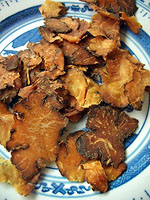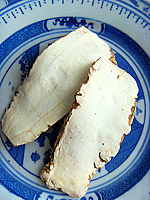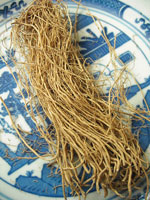Wind-cold headaches & the Chinese remedies
Headache pattern: acute onset, headaches involving the upper neck and with a binding sensation around the head, triggered or aggravated by cold air and wind blowing upon the face, more frequent during winter.
Accompanied symptoms: aversion to wind blowing, chills, general aches, a thin-white coating on the tongue, and floating and tense pulse.
Analysis: in traditional Chinese medicine (TCM) theory, the bladder meridian governs the body surface. When external wind and cold invade the body, the meridian is usually affected, resulting in discomforts along its pathway such as pain in the head and neck. The wind and cold pathogens hinder the protective qi flowing on the body surface, so there are aversion to wind, chills and general aches. The tongue coating and the pulse also indicate that the pathogens are located in the exterior portion of the body.
Therapeutic principle: disperse wind and dissipate cold, regulate blood and stop pain
Sample prescription: Tea-Blended Sichuan Lovage Powder
In the prescription, the Sichuan lovage is pungent and warm in properties, which promote qi flow and regulate blood circulation; the notopterygium root, Dahurian angelica root and Manchurian wildginger can dissipate cold, enhance the meridian flow of the head and stop pain, these four serve as the main herbs. Sichuan lovage specializes in relieving pain on the crown and side of the head, notopterygium root specializes in relieving pain on the posterior head and neck, Dahurian angelica root can relieve the pain on the front head, and Manchurian wildginger can treat pain all over the head. The schizonepeta herb, ledebouriella root and peppermint also specialize in acting in the upper body, to dispel the wind pathogens and relieve the accompanied symptoms. The tea leaf removes heat from the head and refreshes the mind, it also modulates the harsh properties of other herbs. The liquorice root relieves pain and acts as a buffer.
 |
|
 |
|
 |
| Sichuan lovage |
|
Dahurian angelica root |
|
Manchurian wildginger |
Some modifications can be made according to the specific symptoms.
Stuffy or runny nose indicates that the remedy should dissipate excessive coldness and unblock the orifices. Select herbs like:
| cang er zi |
siberian cocklibur fruit |
Fructus Xanthii |
| xin yi |
biond Magnolia flower |
Flos Magnoliae |
Apparent stiff neck should use extra herbs to dispel excessive wind and relax the muscles.
| ge gen |
kudzu root |
Radix Puerariae |
Nausea, vomiting and a thick-greasy tongue coating indicate that the remedy should harmonize the stomach and descend the adverse qi.
| guang huo xiang |
agastache |
Herba Agastaches seu Pogostemi |
| ban xia |
pinellia tuber |
Rhizoma Pinelliae |
In case if the pain is located in the head crown, add in:
| gao ben |
Jehol ligustium rhizome |
Rhizoma Ligustici |
When the head crown pain is very severe, and there are also retching and excessive saliva, or even cold limbs, white tongue coating and taut pulse, it means that the coldness has entered the liver meridian. The remedy should be modified and selected the below herbs to warm and smooth the meridian.
| wu zhu yu |
Medicinal evodia fruits |
Fructus Evodiae |
| sheng jiang |
fresh ginger |
Rhizoma Zingiberis Recens |
| ban xia |
pinellia tuber |
Rhizoma Pinelliae |
| gao ben |
Jehol ligustium rhizome |
Rhizoma Ligustici |
| chuan xiong |
Sichuan lovage |
Rhizoma Ligustici Chuanxiong |
|